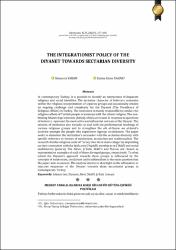| dc.contributor.author | Yakar, Sümeyye | |
| dc.contributor.author | Yakar, Emine Enise | |
| dc.date.accessioned | 2022-07-20T07:06:31Z | |
| dc.date.available | 2022-07-20T07:06:31Z | |
| dc.date.issued | 2021 | en_US |
| dc.identifier.citation | Yakar, S. & Yakar, EE (2021). Diyanet'in mezhep farklılığına yönelik entegrasyoncu politikası. Bilimname , 44(1), , 671-696. https://doi.org/10.28949/bilimname.865737 | en_US |
| dc.identifier.issn | 2148-5860 | |
| dc.identifier.uri | https://doi.org/10.28949/bilimname.865737 | |
| dc.identifier.uri | https://hdl.handle.net/11436/6253 | |
| dc.description.abstract | In contemporary Turkey, it is possible to identify an intersection of disparate religious and social identities. The sectarian character of believers resonates within the religious interpretations of separate groups and occasionally creates an ongoing challenge and complexity for the Diyanet (The Presidency of Religious Affairs) in Turkey. The institution is mainly responsible to conduct the religious affairs of Turkish people in harmony with the Islamic religion. The nonbinding Islamic legal opinions (fatwa), which are issued in response to questions of believers represent the most active and influential outcome of the Diyanet. The mission of institution also includes to deal with the problematical teachings of various religious groups and to strengthen the ahl al-Sunna wa al-Jama'a doctrine amongst the people who experience ingroup socialization. The paper seeks to elaborate the institution's encounter with the sectarian diversity with specific reference to themes of modernism, secularism and traditionalism. The research divides religious sects of Turkey into three main categories depending on their connection with the faith area (i'tiqadi), worship area ('ibadi) and social mobilization (jama'a). The Alevis, Ja'faris, Shafi'is and Nurcus are chosen as representative examples of each of these diverged groups, respectively. To what extent the Diyanet's approach towards these groups is influenced by the concepts of modernism, secularism and traditionalism is the main question that the paper aims to answer. The analysis intents to shed light on the affirmative or rejective responses of the Diyanet towards these sectarianist groups in contemporary Turkey. | en_US |
| dc.language.iso | eng | en_US |
| dc.publisher | İlahiyat Bilimleri Araştırma Vakfı | en_US |
| dc.rights | info:eu-repo/semantics/openAccess | en_US |
| dc.subject | Islamic law | en_US |
| dc.subject | Diyanet | en_US |
| dc.subject | Alevi | en_US |
| dc.subject | Shafii | en_US |
| dc.subject | Ja'fari | en_US |
| dc.subject | Cemaat | en_US |
| dc.title | The integrationist policy of diyanet towards sectarian diversity | en_US |
| dc.type | article | en_US |
| dc.contributor.department | RTEÜ, İlahiyat Fakültesi, Temel İslam Bilimleri Bölümü | en_US |
| dc.contributor.authorID | 0000-0002-4100-9234 | en_US |
| dc.contributor.institutionauthor | Yakar, Emine Enise | |
| dc.identifier.doi | 10.28949/bilimname.865737 | en_US |
| dc.identifier.volume | 44 | en_US |
| dc.identifier.issue | 1 | en_US |
| dc.identifier.startpage | 671 | en_US |
| dc.identifier.endpage | 696 | en_US |
| dc.relation.journal | Bilimname | en_US |
| dc.relation.publicationcategory | Makale - Uluslararası Hakemli Dergi - Kurum Öğretim Elemanı | en_US |


















